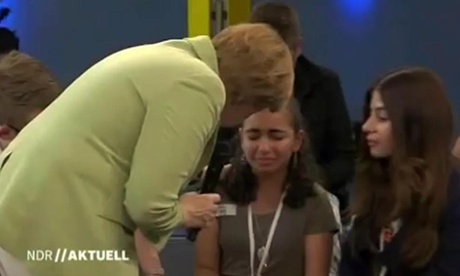Angela Merkel has stood firm against unilateral moves to turn refugees back from Germany’s borders amid a tense dispute on migration policy between the chancellor and her interior minister that could yet bring down the fledgling government.
The standoff in Berlin echoed deepening divisions across Europe over how to handle irregular migration. The issue was also the focus of talks in Paris on Friday, at which the French president, Emmanuel Macron, and Italy’s prime minister, Giuseppe Conte, called for radical, Europe-wide changes to EU refugee policy.
Horst Seehofer, Germany’s interior minister, remained poised to carry out a threat to introduce police controls on Germany’s southern border, according to reports on Friday, as leading members of his CSU party – junior partners of Merkel’s CDU in the coalition government – urged the chancellor to back down.
The hardline interior minister is demanding the right to turn refugees away if they have already applied for asylum in another EU country or had their applications rejected in Germany, a proposal Merkel rejects as in breach of EU law and because she is determined to find a Europe-wide solution.
Merkel, who is in her fourth term as chancellor, has rarely found herself in such a precarious position. If Seehofer goes ahead and implements the most contested part of his immigration “masterplan”, she will have little choice but to sack him.
But that would lead to the collapse of her government, which has been in power for less than 100 days, and almost inevitably to the end of her chancellorship. An interior ministry source told German media that “all that’s needed is a phone call” for Seehofer to implement his plan.
Merkel continues to insist national border controls will only speed up the end of the passport-free Schengen system. Her spokesman, Steffen Seibert, said on Friday she was firmly opposed to unilateral moves to turn back refugees that could increase pressures on countries such as Italy and Greece.
“We must not contribute to weakening the European Union and purely national measures setting the tone again in Europe,” Seibert said. “Then Europe wouldn’t play the strong role in the world that’s required now.”
In Paris, Macron and Conte sought to patch up a Franco-Italian diplomatic spat sparked this week by the French president accusing Rome of “cynicism and irresponsibility” after anti-immigration minister Matteo Salvini refused the Aquarius migrant rescue ship access to Italian ports, forcing it to head to Spain.
The two leaders called for the EU to set up centres to process migrants’ asylum claims in their home countries, mainly in Africa. “We should create European centres in the countries of departure,” Conte said at a joint press conference.
Macron told reporters he supported the idea of “branches of our asylum agencies to tackle this question on the other side” of the Mediterranean, adding that greater solidarity with Italy was needed over the migrant burden it is shouldering.
The French president also called for tougher protection of Europe’s external borders insisting “the proper response is European” but needed adapting, including “profound reforms” of the EU’s Dublin regulation which requires migrants to claim asylum in the first European country they enter.
Macron openly backed Merkel in her standoff with Seehofer, saying countries should be “committed to the paths taken by their heads of state or government”. The EU 27 are due to discuss changes to the bloc’s asylum rules at a summit at the end of June, but there are few signs they are ready to coordinate their policies.
Merkel has the backing of her CDU party to wait until the summit. She reportedly said she felt “strengthened” by the party support, and was not expecting her government to collapse.
But with other EU members at loggerheads on the issue, and Merkel having herself admitted it is highly unlikely a European deal can be reached so quickly, the decision to wait until 28 June might do little other than buy her a stay of execution.
The CSU has said it is not prepared to wait for two weeks. Markus Söder, the minister president of Bavaria and a leading member of the party, said: “Why will we achieve something in two weeks that was not possible in three years?”
The reference was to the refugee crisis in the summer of 2015, when Merkel’s open-border policy allowed almost a million refugees to enter Germany – a decision widely blamed for helping the rightwing, populist and anti-immigrant Alternative für Deutschland (AfD) into the Bundestag in elections last year.
The CSU’s party executive is due to meet on Monday to hammer out its position on the issue, while the CDU’s leadership is to assemble on the same day, meaning a renewed showdown between the two partners – who until the refugee crisis had cooperated in relative harmony for decades – is to be expected.
The stubborn stance of the Bavaria-based CSU has been put down to its upcoming state elections, where it faces a drubbing by the AfD to which it has already lost millions of voters.
Söder insisted the CSU was not staging a putsch to topple Merkel. “It’s about restoring trust in the German state of law which has been shattered,” he said.
Germany’s finance minister, Olaf Scholz of the Social Democrats, also partners in the coalition, accused the CDU and CSU of acting as though they were in a fantasy thriller. “The task of governing our country is not an episode of Game of Thrones, rather a serious matter,” he tweeted on Friday.












